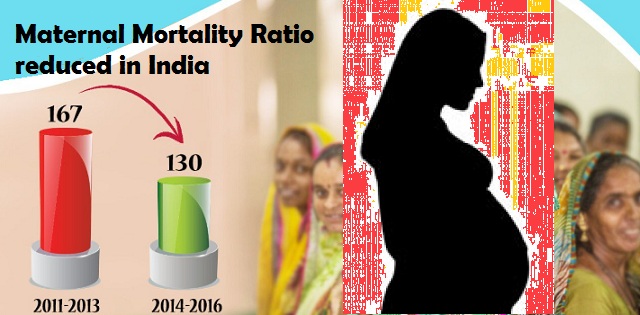
A renewed global and national commitment has been made to end preventable maternal deaths, focusing on improved healthcare access, policy reforms, and maternal health awareness.
Context :
Despite significant progress in reducing maternal mortality in India, 93 women still die for every 1,00,000 live births (MMR: 93 as per SRS 2019–21). This article highlights regional disparities, the "three delays" model, and practical interventions necessary to achieve the goal of zero preventable maternal deaths.
Key Data Points:
India's MMR:
103 (2017–19) → 97 (2018–20) → 93 (2019–21)
State-Wise Disparities:
Kerala (Lowest): MMR 20
Madhya Pradesh: MMR 175
Assam: MMR 167
Punjab, Haryana, WB: MMR 98–109
Southern States Average: 20–63
EAG States Average: 100–175
Three Delays Leading to Maternal Deaths:
Delay in Recognizing Danger and Seeking Care
Lack of awareness, financial constraints, social barriers
Mitigated by ASHA–ANM collaboration and JSY incentives
Delay in Reaching Health Facility
Remote geographies, poor transport
108 Ambulance and NHM transport support helped but gaps remain
Delay in Receiving Quality Care at Facility
Unavailable specialists, blood banks, equipment
FRUs often non-functional due to staff and infrastructure gaps
Medical Causes of Maternal Mortality:
Postpartum Hemorrhage (PPH): #1 killer
Obstructed Labour: Often in undernourished adolescent mothers
Hypertensive Disorders (eclampsia): If not managed in time
Unsafe abortions and infections (esp. by quacks)
Complications in home deliveries by untrained birth attendants
Associated conditions: Malaria, TB, anaemia, UTI
Systemic Challenges Identified:
66% vacancies in specialist posts in CHCs
Lack of operational FRUs (First Referral Units)
Inadequate blood storage and transfusion capacity
Neglected mental health issues in mothers
Poor quality emergency obstetric care in some states
Failure to implement technical protocols uniformly across India
Successful Interventions and Models:
Kerala’s Confidential Review of Maternal Deaths
Helps identify cause-specific mortality
Has lowered MMR to 20
Special protocols: Uterine artery clamp use, suction cannula for atonic uterus, rapid response to embolism, coagulopathy, hepatic failure
Addressing perinatal depression and post-partum psychosis
Kerala includes mental health in maternal care
Policy Suggestions & Way Forward:
Differentiated Strategy by State Cluster
EAG states: Focus on basic implementation (access, antenatal care, transport)
Southern/Better-off states: Refine quality, fill specialist gaps, mental health
Operationalize Minimum 4 FRUs/District
Ensure staffing (obstetrician, anaesthetist, paediatrician) and blood units
Emergency surgical care must be available 24x7
Ensure Early Antenatal Registration
Iron-folic acid supplementation, hypertension monitoring
Promote institutional deliveries with incentives
Strengthen Data Systems
Enforce Maternal Death Surveillance and Response (MDSR)
Use Confidential Reviews to identify systemic gaps
Focus on Adolescent Girls’ Nutrition and Education
Address intergenerational malnutrition and anaemia
Prevent early and unsafe pregnancies
Invest in Public Health Cadre and Infrastructure
Fill specialist vacancies in CHCs
Equip FRUs and PHCs for basic and emergency obstetric care
Conclusion:
India has made notable progress in reducing maternal mortality, but the goal of zero preventable maternal deaths requires targeted policy, better health infrastructure, skilled manpower, and community engagement. The Kerala model, ASHA-ANM efforts, and technology-enabled maternal care offer replicable examples. Political and administrative will, backed by scientific and empathetic public health planning, will be key to saving lives and ensuring safe motherhood for all.
12-Jul-2025 05:35 PM
Prime Minister Narendra Modi emphasized the critical role of the...
12-Jul-2025 05:26 PM
Endocrine disruptors found in plastic waste pose a serious public...
12-Jul-2025 04:26 PM
Prime Minister emphasized that BRICS aims to create a balanced,...
12-Jul-2025 04:17 PM
A recent study highlights that the Sinhalese community of Sri...
08-Jul-2025 05:33 PM
A renewed global and national commitment has been made to...
08-Jul-2025 05:21 PM
The Andhra Pradesh government has approved the Amaravati Quantum Valley...
08-Jul-2025 02:41 PM
A rare Roll Cloud was recently spotted, showcasing a horizontal,...
08-Jul-2025 02:49 PM
Naga tribes have announced plans to resume protests against Nagaland’s...
08-Jul-2025 05:21 PM
The Andhra Pradesh government has approved the Amaravati Quantum Valley...
Leave a Comment